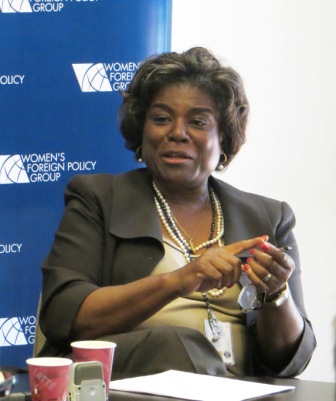STATE DEPARTMENT BRIEFING
US Foreign Policy: Challenges and Opportunities in Africa
Ambassador Linda Thomas-Greenfield, Assistant Secretary of State for African Affairs
Photos

Washington, DC—On June 23, 2014, Assistant Secretary of State for African Affairs Linda Thomas-Greenfield addressed the challenges and opportunities in US–Africa foreign policy in a conversation with WFPG members and guests. Ambassador Thomas-Greenfield discussed key US priorities on the continent including counter-terrorism strategies in Nigeria and the Horn of Africa, development and human rights issues, and opportunities for increased US–Africa economic cooperation through Power Africa and Trade Africa. The Ambassador also spoke about two significant initiatives being held this summer to promote African leadership, the Young African Leaders Initiative and the African Leaders Summit. The discussion was moderated by WFPG President Patricia Ellis.
In her remarks, Ambassador Thomas-Greenfield addressed several security concerns on the continent, including joint US–Africa efforts to combat terrorism. She discussed the situation in Nigeria with the kidnapped schoolgirls, explaining that Boko Haram had been “emboldened by the attention” from the international community. Despite this, the Ambassador believed that heightened public attention had allowed the US, with its African and international partners, to galvanize the resources necessary to find the girls. On the escalation of terrorist activity in the Horn of Africa, Ambassador Thomas-Greenfield explained that al-Shabaab continues to adjust their methods to defy security forces in Kenya and Somali. The recent spate of attacks demonstrate the importance of a interregional approach to fighting terrorism, and she spoke about the success of local security forces in shrinking al-Shabaab’s territorial hold.
While discussing regional security challenges, Ambassador Thomas-Greenfield emphasized that they cannot be resolved solely through military means, stressing that comprehensive socio-economic and political solutions are also needed. She argued that extremist philosophies become appealing when young men lack a vested interest in their country’s future, and highlighted the importance of providing opportunities for economic empowerment and accessible social services. The Ambassador also discussed the importance of girls education and explained that the “economic empowerment of women are critical to the health and success of any society”.
Ambassador Thomas-Greenfield also affirmed the US’ commitment to “guaranteeing the rights of every person in Africa to express themselves without fear”. On the topic of democratization, the Ambassador underscored the importance of promoting free and fair elections as well as strong democratic institutions. When asked about LBGT rights on the continent, Ambassador Thomas-Greenfield explained that the US supports policies of non-discrimination and is dealing with them at the global level.
In addition to discussing the challenges facing the continent, Ambassador Thomas-Greenfield spoke about the opportunities for growth and discussed two major initiatives launched by President Obama. Power Africa aims to increase access to electricity in Sub-Saharan Africa and works with African governments and other partners to create infrastructure for reliable power. Trade Africa is designed to promote economic development by reducing trade barriers and strengthening commercial ties. The initiative is aimed at “moving beyond outdated models for aid” and focuses on creating a favorable business climate for private sector growth. While discussing Trade Africa, the Ambassador contrasted the US approach to resource development with the extractive nature of China’s approach, explaining that the US looks to foster sustainable growth.
Ambassador Thomas-Greenfield also discussed two programs that look to build on the US–Africa partnership. In August, President Obama is planning on hosting the US-Africa Leaders Summit, a conference designed to build on US trade and investment, peace and security, and development priorities. The other program is the Young African Leaders Initiative, for which 500 of Africa’s next generation of leaders arrived in the US just last week to participate in a six-week academic and training program. Picked from over 50,000 applicants, these ambitious youths represent a “catalyst for change” and embody a new approach to politics, community development, and entrepreneurship. Ambassador Thomas-Greenfield spoke highly of the program participants, vowing that if these young leaders “are a sign of the future of Africa, Africa is just fine”.